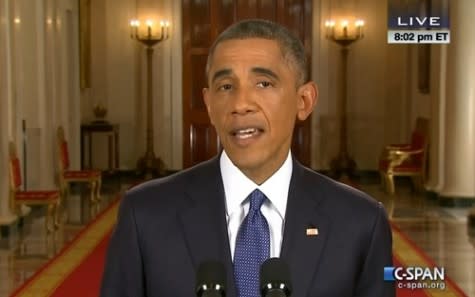How the immigration and executive order debate tests presidential power
President Barack Obama’s new executive orders about immigration have reignited a long-simmering debate about the constitutional extent of the President’s powers to act independently of Congress.
On Thursday night, the President said he will use this executive order power to direct executive agencies to emphasize border security and deemphasize the deportation of as many as 4 million unauthorized immigrants from the United States. Certain immigrants will have a chance to apply for work permits, but they can’t take part in Obamacare.
Under President Obama’s plan, undocumented parents of U.S. citizens and legal permanent residents will be granted three years of deportation relief. To qualify, they must have lived in the United States at least five years. The Obama administration said it will start taking applications in the spring, leaving it up to the next President in 2017, or Congress, to change the program or eliminate it.
The DACA program for children established in 2012 will be revised to provide three years of relief and DACA applicants must have arrived in the United States by January 1, 2010. The order will also allow for visas for immigrants who can prove that they are contributing economically in the United States and for workers in some high-tech fields.
Homeland Security is also ending a program called Secure Communities that required local law enforcement agencies to detain immigrants who were arrested until they could be evaluated by federal agents. A new program will give local law enforcement to more latitude to notify federal authorities.
And President Obama directed federal border control agents to focus on felons, gang members and recent entrants as a matter of enforcement policy.
Concurrent with the speech, the Justice Department Office of Legal Counsel released a 33-page memo with the legal rationale behind Obama’s move.
As expected, the Justice Department cited the executive power of “prosecutorial discretion” to allow President Obama to direct how federal law enforcement prioritizes immigration-related actions. The Justice Department cited actions by Ronald Reagan and George H.W. Bush that granted immigration relief without consent of Congress, as part of its rationale.
The moves had been expected for days and strong protests erupted from Republican leaders, who saw the immigration orders as the latest in a series of moves by the President that they believe are unconstitutional.
Senator John Cornyn, a top Republican, said before the speech that President Obama was preventing a long-term revision of the immigration system through his short-term actions.
“I believe his unilateral action, which is unconstitutional and illegal, will deeply harm our prospects for immigration reform,” Cornyn said on Wednesday. “It will be deeply harmful to our nation’s tradition of the rule of law and deeply harmful to the future of our democracy.”
The clash over executive power between the White House and Republican leaders goes back several years and includes complaints over President Obama’s use of military resources in Libya, Syria and Iraq, and the President’s decisions about how the Affordable Care Act is implemented.
But the President’s orders on immigration are seen by many critics as his broadest act of executive power in disregard of the wishes of Congress.
The constitutional base for the executive order is the president’s broad power to issue executive directives. According to the Congressional Research Service, there is no direct “definition of executive orders, presidential memoranda, and proclamations in the U.S. Constitution, there is, likewise, no specific provision authorizing their issuance.”
Article II of the U.S. Constitution vests executive powers in the President, makes him the commander in chief, and requires that the President “shall take Care that the Laws be faithfully executed.” Laws can also give additional powers to the President.
The order is a directive from the president that has much of the same power as a federal law. And like a federal law, Congress can pass a new law to override an executive order, subject to a presidential veto.
While no one is contesting the legacy of executive orders in general, the President’s critics believe he has overextended the power in constitutional terms.
“While several presidents — both Republican and Democrat — have used prosecutorial discretion to temporarily delay deportation in the face of wars (Nicaragua, Kuwait), hurricanes or earthquakes (El Salvador, Nicaragua, Honduras) and other discrete natural and political catastrophes, no other president has claimed the constitutional authority to ignore immigration law because he believes it’s unfair as a matter of permanent national policy,” says Elizabeth Price Foley from the Florida International University College of Law, in a New York Times op-ed piece this week.
“As nonenforcement of the law leans toward thwarting Congress’s statutes, rather than merely conserving resources, prosecutorial discretion turns into an abuse of power,” argues Josh Blackman from the South Texas College of Law, in a separate New York Times piece.
Eric Posner from the University of Chicago Law School presented a different argument in the New York Times roundtable. Posner believes Obama has the power constitutionally to issue the immigration orders, but there isn’t guidance on how much of a law needs to be enforced in some cases.
“If, under the Constitution, the president must enforce much of the law but need not enforce all of it, where should the line be drawn? It might be surprising that after two centuries of constitutional experience, we don’t know the answer,” he stated.
Recent Stories on Constitution Daily
What constitutional options remain for the GOP to block Obama’s executive order?/a>
Flaps over executive orders go back to Lincoln’s time
New Jersey reconsiders law banning cursing in front of children


